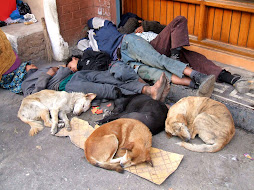 Miracles do happen. Otherwise, how to explain this story?
Miracles do happen. Otherwise, how to explain this story?Flora was rescued from a brick kiln on a hot day in May. She was malnourished and her hips were covered in bruises from overloading. Flora's hoofs had grown so long, they actually pointed upwards. Flora found a perfect home at the Marston's, a British family that has lived in Nepal since the 60s. Here she shares a lovely garden with five rescued dogs and a flock of ducks, recovered from the butcher's. One of the first things Flora did was walk around the house, and roll on her back in the garden. She must have felt she had arrived in heaven.
A month after her arrival, Robin and Wendy noticed a swelling in Flora's lower stomach. They called the vet, who adviced a drug against fluid retention. A few hours later the vet arrived, felt around, and pulled out.....two feet! Three people rushed to help to pull out what everyone thought had to be a
 dead fetus. But as soon as the fowl fell on the ground it started moving. Ten minutes later it stood on its four legs. Puja was born.
dead fetus. But as soon as the fowl fell on the ground it started moving. Ten minutes later it stood on its four legs. Puja was born. Puja is a healthy and curious foal, a true heart breaker, who enjoys making friends with dogs, ducks and people. Her mum, Flora, is a caring and proud mum.
At Animal Nepal we feel greatly encouraged by stories such as these. This story shows the resilience of abused working animals, when given a new leash of life. It shows that with a dosis of TLC, nutritious food and supportive medicines, donkeys like Flora, after a life of neglect and abuse, make great pets. It shows that despite the many challenges we face we can make a difference in the lives of working donkeys, starting with Flora and Puja.










